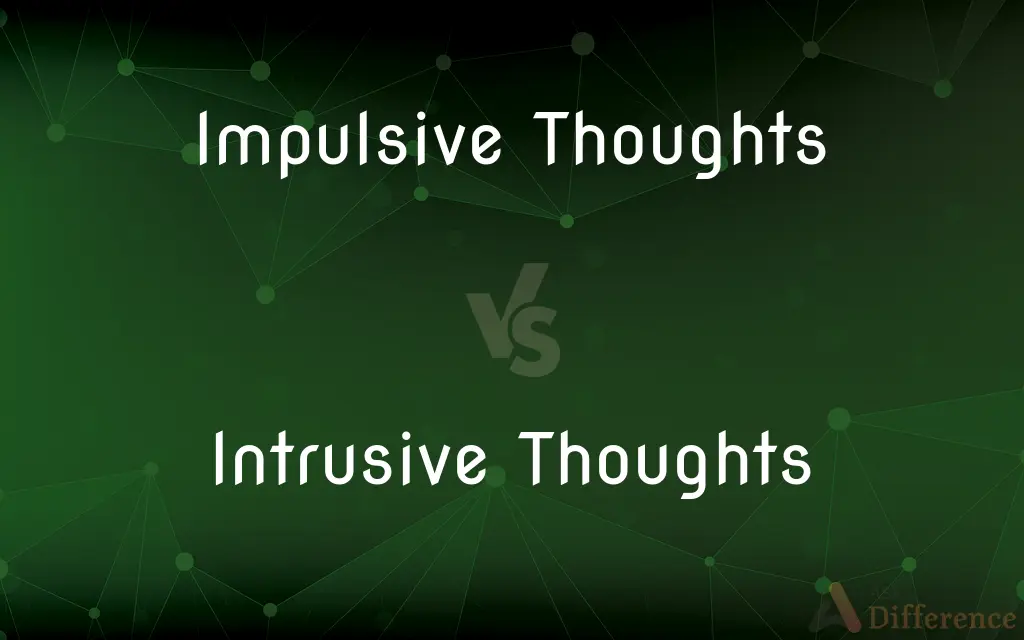Impulsive Thoughts vs. Intrusive Thoughts — What's the Difference?
By Maham Liaqat & Urooj Arif — Published on March 1, 2024
Impulsive thoughts are sudden urges to act without forethought, often driven by emotion, while intrusive thoughts are unwelcome, often distressing ideas or images that involade the mind unbidden.

Difference Between Impulsive Thoughts and Intrusive Thoughts
Table of Contents
ADVERTISEMENT
Key Differences
Impulsive thoughts are characterized by their sudden and compelling nature, urging an individual to act quickly without much deliberation. These thoughts are closely tied to emotions and desires, reflecting a person's spontaneous reactions to their environment or internal states.
Intrusive thoughts are involuntary, often causing significant distress as they can be negative, unwanted, and in stark contrast to an individual's values or beliefs. They are not tied to actions but to the mental landscape, persisting despite efforts to ignore or suppress them.
Impulsive thoughts can lead to immediate actions, sometimes regrettable, while intrusive thoughts typically do not result in direct action. Instead, they can lead to anxiety, guilt, or shame, as individuals struggle with the content of these thoughts.
The management of these thoughts differs significantly: impulsive thoughts may require strategies to pause and reflect before acting, whereas intrusive thoughts often benefit from cognitive-behavioral techniques to manage and reduce their impact.
Understanding the distinction between impulsive and intrusive thoughts is crucial for addressing them effectively. While both can disrupt an individual's peace of mind, their origins and the strategies for mitigation vary, highlighting the importance of tailored approaches in mental health care.
ADVERTISEMENT
Comparison Chart
Definition
Urges to act quickly without deliberation, driven by emotion.
Unwanted, distressing ideas or images that enter the mind unbidden.
Nature
Action-oriented, spontaneous.
Passive, distressing.
Origin
Emotional responses, desires.
Anxiety, fear, or other psychological factors.
Impact on Behavior
Can lead to immediate, sometimes regrettable actions.
Rarely leads to direct action but can cause distress.
Management Strategies
Reflection, mindfulness, and controlling impulses.
Cognitive-behavioral therapy, mindfulness, and acceptance.
Compare with Definitions
Impulsive Thoughts
A sudden desire to quit your job on a bad day.
Feeling frustrated, he had the impulsive thought to resign immediately.
Intrusive Thoughts
Recurrent thoughts of catching a disease from common surfaces.
Touching the doorknob triggered an intrusive thought about contamination.
Impulsive Thoughts
An urge to buy something expensive on a whim.
Seeing the sale, she was struck by an impulsive thought to purchase the luxury watch.
Intrusive Thoughts
An irrational fear of shouting in a quiet place.
Sitting in the library, she was plagued by an intrusive thought of screaming without reason.
Impulsive Thoughts
Choosing to skip a planned workout for an unplanned outing.
Despite her fitness goals, she had the impulsive thought to go out with friends instead.
Intrusive Thoughts
A persistent worry about leaving the door unlocked.
Even after checking twice, the intrusive thought that she left the door unlocked nagged at her.
Impulsive Thoughts
A split-second decision to take a road trip.
Waking up to a sunny day, they had an impulsive thought to drive to the beach.
Intrusive Thoughts
An unwanted thought of harming a loved one.
While holding the knife, he was disturbed by an intrusive thought of injury.
Impulsive Thoughts
The idea to call an ex-partner late at night.
After a few drinks, he had the impulsive thought to call his ex.
Common Curiosities
Can impulsive thoughts lead to positive actions?
Yes, not all impulsive thoughts lead to negative outcomes; some can result in positive, spontaneous decisions.
Do impulsive thoughts indicate a lack of self-control?
Not necessarily, as everyone experiences impulsive thoughts; however, frequent impulsive actions can indicate areas where self-control could be improved.
How can I manage intrusive thoughts?
Intrusive thoughts can be managed through techniques like mindfulness, cognitive-behavioral therapy, and by challenging the thoughts' validity.
Is it possible to stop having impulsive thoughts?
Completely stopping impulsive thoughts may not be possible, but strategies can be developed to manage them effectively.
Can stress cause intrusive thoughts?
Yes, stress can exacerbate or trigger intrusive thoughts, as well as affect their frequency and intensity.
How common are intrusive thoughts?
Intrusive thoughts are a very common experience, with many individuals experiencing them at some point in their lives.
What causes impulsive thoughts?
Impulsive thoughts are often driven by immediate emotional responses or desires, without much consideration for consequences.
Is acting on impulsive thoughts always bad?
Not always; some impulsive actions can lead to positive experiences or opportunities, though it's important to consider potential consequences.
Are intrusive thoughts dangerous?
No, intrusive thoughts are not dangerous and are a common experience for many people, although they can be distressing.
Can children experience impulsive and intrusive thoughts?
Yes, children can experience both types of thoughts, often reflecting their developmental stage and emotional regulation skills.
Are intrusive thoughts a sign of mental illness?
While intrusive thoughts can be a symptom of certain mental health conditions, having them does not automatically indicate a mental illness.
Are there medications that help with managing intrusive thoughts?
Medications, particularly those used in treating anxiety and depressive disorders, can help manage the symptoms associated with intrusive thoughts.
Share Your Discovery

Previous Comparison
Fudge vs. Tablet
Next Comparison
In Honor Of vs. In Memory OfAuthor Spotlight
Written by
Maham LiaqatCo-written by
Urooj ArifUrooj is a skilled content writer at Ask Difference, known for her exceptional ability to simplify complex topics into engaging and informative content. With a passion for research and a flair for clear, concise writing, she consistently delivers articles that resonate with our diverse audience.














































